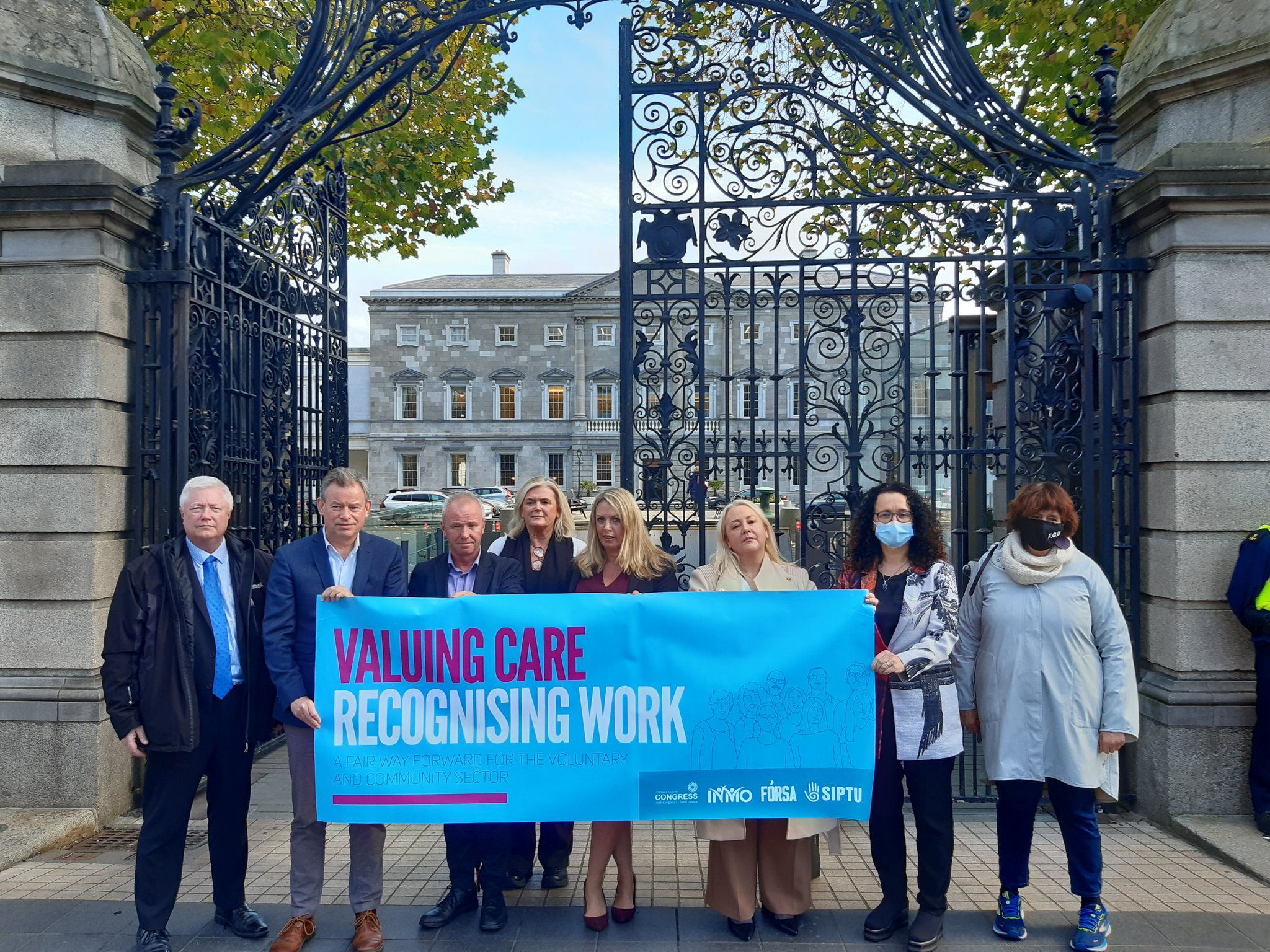Fórsa, the INMO and SIPTU trade unions and the Irish Congress of Trade Unions (ICTU) are to a lodge a pay claim for thousands of workers employed in the voluntary and community sector. Unions are also seeking to establish an appropriate collective bargaining forum for the sector where pay, terms and funding can be properly established.
The unions say the pay claim, set at 3%, would bring tens of thousands of workers in the community and voluntary sector in line with pay patterns across all sectors, including the pay provisions contained in the public service agreement, Building Momentum.
Workers in the community and voluntary sector provide a huge range of community-based services in health, including care for older people and people with disabilities, services for people with addiction, homeless services and a range of services to children, as well as community development, local employment services, jobs clubs, homework clubs and family resource centres, providing services for “everyone from nought to a hundred years of age.”
The unions launched a joint campaign today (Tuesday 9th November) Valuing Care/Recognising Work, which aims to find “a fair way forward” for workers in the community and voluntary sector.
Tens of thousands of workers in the sector provide a range of services for everyone from nought to a hundred years of age.
Unions confirmed today that the vast majority of workers providing these services have not had any pay improvements since the collapse of social partnership in 2009, and the subsequent decoupling of the sector from pay provisions included in public sector pay agreements. Unions have also identified a significant issue with the retention of staff in the sector, up to a third of whom are leaving their jobs each year to avail of better terms in other employments.
Worker flight
Fórsa assistant general secretary Catherine Keogh said that if political leaders are serious about valuing workers, and about providing care and services where they are needed most, they must fund them properly: “We need to stop the annual cycle where unions are forced to agitate to ensure the appropriate funding is in place to ensure these services are maintained.
“Employers in the sector are witnessing a flight of workers – up to a third of their staff each year – which has the knock-on effect of creating additional recruitment costs. The loss of experienced staff has an immeasurable negative impact on the continuity of care they provide,” she said.
Workers in the sector say that the Covid-19 pandemic has led to a substantial increase in demand for services provided by the sector, but no increase in the annual grant funding available to organisations that provide services. For example, addiction services have witnessed a huge increase in referrals, but are working with the same level of resources available prior to the onset of the pandemic.
In a letter to the Taoiseach sent today, union leaders said that while the Government is the principal funder of the sector, it has consistently denied any responsibility for the terms and conditions of employment which exist within it: “The adoption of this position by successive administrations has led directly to a highly dysfunctional industrial relations environment where recommendations by the Labour Court and other Employment Law Bodies remain unimplemented because the relevant government department will not fund the employer to comply with same.”
Union leaders have sought a meeting with the Taoiseach on the issues raised by the campaign. They added: “The only viable and sustainable industrial relations solution to this claim, and the further multitude of industrial relations issues which bedevil the sector, is through the creation of a collective bargaining platform whereby terms and conditions of employment can be addressed and resolved.”
Precarious
SIPTU public administration and community sector official Adrian Kane, said: “Most workers in these sectors are precariously employed with little or no pension cover or sick pay. We need to find a fair way forward for the voluntary and community sector.
“These workers are the glue that holds our communities together. We want to ensure their work is recognised and valued. We’re putting in a pay claim of 3%, for a group of workers who have endured pay cuts, reduced working time, and zero pay improvements since 2008.
“Central to all of this is the establishment of an appropriate collective bargaining forum for the sector where we can negotiate pay, terms and funding for the sector with its primary funder, which is the State,” he said.
Employers in the sector are witnessing a flight of workers - up to a third of their staff each year - which has the knock-on effect of creating additional recruitment costs. The loss of experienced staff has an immeasurable negative impact on the continuity of care they provide.
Community development worker Roisin Ryder said: “This is complex and skilled work. We need to attract skilled and talented people but there’s no pension or competitive pay scale. There’s been an exodus from the community sector to the HSE, and why wouldn’t they? They can get better pay and a pension elsewhere.”
INMO assistant director of industrial relations, Albert Murphy, said: “The INMO fully supports the claim to enhance conditions for those working in the community and voluntary sector. We need to ensure that the work provided by nurses in the community and voluntary sector is properly valued and recognised.
“Like many other aspects of the health service recruitment and retention is a major issue in the community and voluntary sector. In order to make working in this sector a viable career path for many nurses, and other patient-facing healthcare workers, they should be treated the same as their colleagues providing care to patients and service users.
“We need to see urgent action on terms and conditions for workers in this sector otherwise nurses will not stay in these services,” he said.
It’s never been more important – or easier – to get the protections and benefits of union membership. Join Fórsa HERE or contact us HERE.

